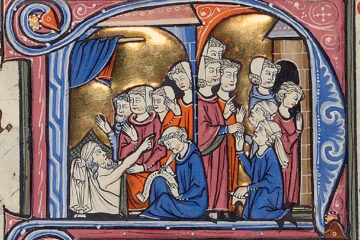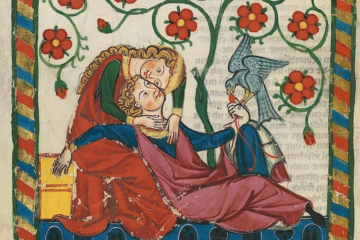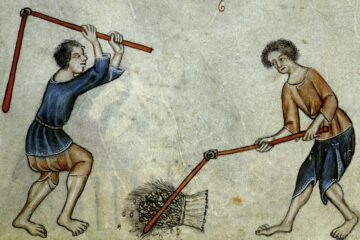Much to the dismay of her political opponents, Queen Mother Elanor’s reforms have taken firm root in Rosewoodian society. Even before it was decreed and made law, the people of Rosewood have maintained a tradition of fairness towards the fairer sex. Being France’s first Queen, Lady Elanor made sure to extend as many privileges as possible to the women of the Capital. In her wisdom, she knew the extent of the Royal Family wanes beyond the walls. Instead of enacting laws affecting her entire Kingdom, but granting minimal freedoms, she chose to concentrate all her efforts on the City of Rosewood, where the most esteemed members of society dwell.
Unlike the countryside and other rural areas of France, the women of Rosewood are famous for their liberties. Physically, women are allowed to express their beauty through their natural hair. While most women in France would find it indecent to reveal their hair to unknown men, the women of Rosewood enchant visitors and citizens alike with their feminine allure. If a woman has let her hair down, it means she is unmarried. If her hair is well-kept and tied up, perhaps even covered, it means she is likely married or a widow. The way women in Rosewood dress is what shocks most visitors. The norm has always been that women ought to conceal as much of their figure as possible. Men will most often wear tunics that are thigh or knee-length. Women in rural areas will wear calf-long tunics or ankle-long dresses or kirtles. In Rosewood, however, working women are known to wear knee-length tunics as well, usually always paired with long cloth-woven stockings meant to cover any skin. This maintains that most women, even though having fewer restrictions on what they were allowed to wear, still desired to carry themselves with decency. The Right to Skin, as it is colloquially known, extends to the arms as well. While rural women almost never expose their forearms, save for the hardiest peasant woman, the women of Rosewood may wear their dresses, kirtles, and tunics forearm-length, elbow-length, and sometimes even short-sleeved. These garments would also oftentimes be supported by a belt. Finally, the Queen’s Right to Skin extends even to the chest area. The women of Rosewood, usually the young, unmarried, and working sort, enjoy a unique freedom wherein they may wear designs that reveal their necks, the top part of their chest and back, as well as dress designs that show the shoulders. While cloaks and capes are mostly reserved for men, there is no law prohibiting women from wearing them. However, they will probably be mistaken for a man if they are hooded. The Right to Skin sparks the most controversy during the months of Summer, which is when the Church becomes most desperate to curb the seemingly immoral practice. Most families still maintain the Catholic virtue of decency, however, society in the City is slowly becoming more and more tolerant of women’s freedom. Whether or not this trend will die out in the coming years remains to be seen.
In the Kingdom of France, as is the case with most of Europe, daughters are the legal dependents of their fathers, and then of their husbands. A woman’s primary role is to bear and raise children. In Rosewood, however, women are given more career opportunities, thus giving them less time to devote to their families. Most women will give up their work for the sake of their children, however, some women rise through the ranks of their respective life paths and become influential, some even having successful families. These women will often have to carry their children with them wherever they go or employ the aid of a servant woman to keep their home for them, thus also keeping an eye on their sons and daughters. Therefore, married women still retain the right to make deals, serve as witnesses, and take loans. Women are freely admitted into artisan guilds, most labor if they can handle it, and women are known to volunteer for the City Watch as well, an old tradition dating back to the Age of the Empire.
Female criminals are rare, but will often be given more lenient punishments depending on their situation. Pregnant women cannot be executed until they have given birth. Additionally, no woman may be burned as punishment for her crimes within the Walls of Rosewood. Due to being lenient towards women, those who are destitute may easily find themselves working for criminal gangs, enticed by the promise of easy reward with lesser risk.
The drawback of being famous for their beauty and freedom is that the women of Rosewood are infamous for their indecent and decadent behavior. Whether it is a fact of life or merely a stigma that developed over time, it exists both within and outside the Walls. This is amplified by the fact that, besides outright crime, the poor and destitute women of Rosewood will often turn to prostitution. Harlots, whores, and Jezebels, as they are known within the City are identifiable by their clothing or lack thereof. They will either wear a striped article of clothing, which is unusual for the time, or they will expose their knees, feet, navel, or perhaps more of their chest or back than they are allowed to. Alternatively, women may enter sex work within bathhouses, as it is a public secret that some bathhouses offer “additional services” in addition to regular baths. Prostitution is of course against the law, and the Church abhors it since it promotes premarital sex and may lead to bastard children.
Rome has been pressuring Rosewood to crack down on its immorality for ages, however, the Crown, Parliament, and Archbishopric have refused to take any action, claiming that “men and women are equal parts of the same whole, and should be treated as such. Brothers and sisters, all from the same Father.” Women do enjoy certain liberties, but will always be victims of strange looks if they choose to leave the comfort of their Walls. The Queen’s Prerogative can only stretch so far.


